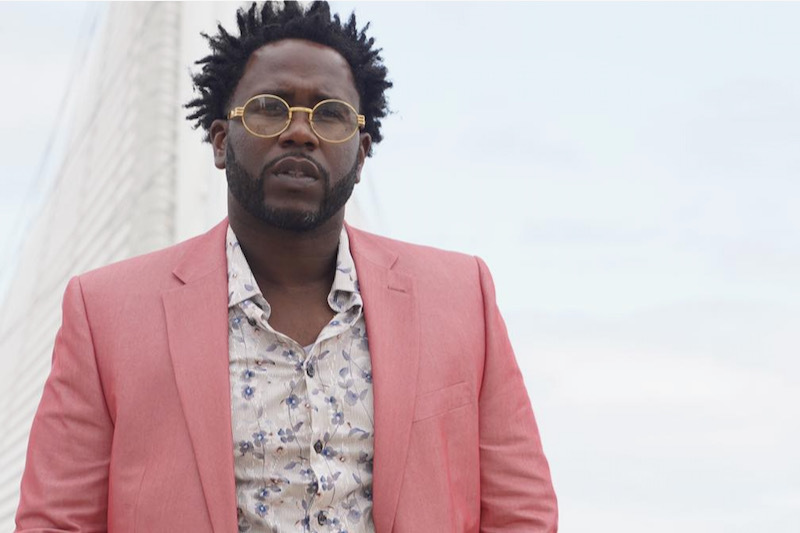In the west atrium of the BMO Harris Bradley Center, an expiring building essentially – excitingly – being buried alive by his news, Peter Feigin announced Wednesday that the Milwaukee Bucks and the Wisconsin Center District had signed a lease agreement for a new arena that will keep the team here for the next 30 years.
According to both sides, the arena, currently estimated at $524 million, will serve as the centerpiece of a billion-dollar development plan to invigorate the city and stimulate economic growth throughout the region.
As WCD Board Chairman Scott Neitzel laid out the fiscal provisions – the public's contribution will not exceed $250 million; the 30-year lease with two five-year extension options is per Act 60 legislation; the deal includes "one of the most robust non-relocation agreements" across professional sports – Feigin, the exuberant team president, called the Bucks "the catalyst for widespread development in Downtown Milwaukee for many years to come."
Ground will be broken on June 18, he said, and construction will begin on the 17,500-seat arena that's set to be completed in summer 2018.
When I asked Feigin in the press conference about naming rights for the new venue, he replied with a smile, "We’ve had a really exciting process of exploring having embryonic conversations with potential sponsors." Got it. He added that having the lease finished "will allow us to accelerate those discussions" and looked forward to announcing team partners in the future.
On Wednesday night, during the first quarter of the Bucks' 97-92 loss to the Pacers in their season finale, I sat down with Feigin in the bowels of the Bradley Center to further discuss the new arena, the surrounding entertainment zone, current business operations and fan skepticism.
OnMilwaukee: The Bucks (who finished with a 33-49 record) have not had the type of season you guys – and fans – hoped for, and the new arena is still a couple years away. Still, season ticket prices have increased fairly substantially for 2016-17. What have the renewal rates been like and where do you feel the team stands as far as season ticket sales?
Peter Feigin: We’re actually tracking where we were last year in terms of renewal rates, with the expectation that we’ll get somewhere between 92 and 94 percent renewal rates on season tickets. And the real growth is new season ticket-holders. So where do we build that, kind of in the 2,000 range (of more sales), to get us back in close proximity to 8,000-9,000 season ticket-holders?
The real health of a pro team – the average in the NBA is about 10,000. We took over and inherited the team two years ago with just under 3,500 season ticket-holders. So it’s been a real focus and a real effort to build that demand, build value and really create that customer base of season ticket-holders.
OnMilwaukee: The Bucks have emphasized that this isn't just going to be a new arena; you're building a 27-acre retail and entertainment district, with a public plaza and "Live Block" that will include an additional $500 million worth of private investment. Do you have businesses in mind? A wishlist, so to speak, of potential tenants to anchor this $1 billion district, and have you approached any of them yet?
Feigin: That’s in process. We’ve certainly prospected and talked to and we’ve made very public some RFPs on building out residential apartments on the side of Block 7, which is a parking structure. We’re looking at some commercial opportunities on some other blocks, specifically 30,000 square feet beside the training facility on 6th and McKinley.
We just recently named Rinka Chung and Gensler (as the design team) to build out what really is going to be commercial space and a viable investment into this neighborhood, with a live block and plaza. So we’re going as fast as we can possibly go, with no contracts signed with anybody. But we think in the next six months we’ll be in a very active place and we’ll see this whole development kind of evolve into a whole different place.
OnMilwaukee: Is it important to have local tenants in that space, rather than, say, an Applebees?
Feigin: Without a question. I think one thing we learned pretty quickly is this has to be localized to succeed. Wisconsinites and Milwaukee folks are very particular; they want local. Big box does not work, especially with what we’re talking about to really create a unique neighborhood where we want people to live and work.
OnMilwaukee: After the announcement of the 30-year lease deal, and even with the binding non-relocation agreement being so punitive, I still heard fans on the radio say, "they'll leave as soon as they can" and had some ask me on Twitter if I thought the penalties were enough of an actual deterrent. Do you think the Bucks' PR communication has been effective on the arena and do you feel like you have to tailor your messaging to convince some fans you're really all in here?
Feigin: We’ve got to message better. But the truth is, with this lease, you couldn’t fathomably move (laughs), and we’d only agree to that if we were engaged and invested to do this. This lease is basically a covenant to protect not only ourselves, because we want to be here, but the state and the Wisconsin Center District and the public in a real non-relocation.
I mean feasibly, financially, legally, we wouldn’t go. And that’s as much of a commitment – that’s a signed document that says we’re here to stay. So I think we’re getting over that. I think more focus is on what expectations and promises are, as far as performance on the court, how do we make the product better, how do we engage fans at a higher level, how do we continue to evolve the brand and the experience?
OnMilwaukee: This was a landmark agreement on the arena, and both the Bucks and the Wisconsin Center District seem to be really pleased with it. Still, we'd heard for months that the deal was very close and, already, the original $500 million estimate has been increased to $524 million – granted with the Bucks paying for cost overruns. On such a huge, complicated deal, what was the biggest challenge you had to overcome to complete it?
Feigin: The biggest challenge is that there are a lot of cooks in the kitchen. When you’re organizing an agreement that has to do with land transfers and easements and air rights and parking agreements of a city, a county, a state, it’s very challenging to get everybody on the same page. Because you’re simultaneously negotiating contracts with all different parties that all coalesce into elements of the lease, getting everybody on the same page, just literally organizationally, was a real challenge. Communication was one of the biggest parts of this.
And we did it in good manner, efficiently, time-wise, but I think if you added up the hours, this was an intense time period. Through this whole time period, there were no breaks to cool off and say we weren’t on the same page. At all times we were pretty much in agreement on the major points, and these are big, complicated agreements; this is the largest development in the state’s history. And there were a lot of public entities involved and private entities involved, we’ve got local ownership involved. So how do you organize this and get everyone on the same page?
OnMilwaukee: Again, on the court this wasn't the season you wanted, especially since the owners tell Jason Kidd they want to go 82-0. But it seemed like business operations – sales, marketing, merchandise, in-arena entertainment, local buzz, publicity, coverage – were good. Considering the basketball side and the business side, how do you evaluate the success of the 2015-16 Bucks season?
Feigin: I think when you’re managing a company and you’re trying to create a team, I’d explain it as "I’m pleased but not satisfied." You can’t not be happy with where we are and encouraged, too, but the truth is there’s so much opportunity to really do this. And we really have an opportunity to do things that have never been done before in pro sports, in the city of Milwaukee, in the state of Wisconsin. And we’re delusional. So we have ridiculous goals and objectives and we really want to create something that doesn’t exist in a major U.S. city, and we think the city’s going to be ready for it. Not sure if they are now, but they will be ready for it, so it’s exciting.
It’s all about communication, having the right message and following through with it. We’ve learned a great lesson through this whole process: set really realistic expectations and hit them, or you lose equity. And the truth is, we’re outsiders. I’m a New York guy. I could live here 30 years and I still wouldn’t be a Milwaukee guy to a lot of people here. So how to really gain that trust and that equity is to say what you’re going to do and do what you said you were going to do and get it done.
OnMilwaukee: So as a New York guy whose family is still over there (but coming to join him in June), how have you liked Milwaukee and being president of the Bucks?
Feigin: On a personal side, this is the dream of dreams. People don’t get this opportunity. This is running a company, creating a vision, evolving, development. This is fun, fun stuff.
Born in Milwaukee but a product of Shorewood High School (go ‘Hounds!) and Northwestern University (go ‘Cats!), Jimmy never knew the schoolboy bliss of cheering for a winning football, basketball or baseball team. So he ditched being a fan in order to cover sports professionally - occasionally objectively, always passionately. He's lived in Chicago, New York and Dallas, but now resides again in his beloved Brew City and is an ardent attacker of the notorious Milwaukee Inferiority Complex.
After interning at print publications like Birds and Blooms (official motto: "America's #1 backyard birding and gardening magazine!"), Sports Illustrated (unofficial motto: "Subscribe and save up to 90% off the cover price!") and The Dallas Morning News (a newspaper!), Jimmy worked for web outlets like CBSSports.com, where he was a Packers beat reporter, and FOX Sports Wisconsin, where he managed digital content. He's a proponent and frequent user of em dashes, parenthetical asides, descriptive appositives and, really, anything that makes his sentences longer and more needlessly complex.
Jimmy appreciates references to late '90s Brewers and Bucks players and is the curator of the unofficial John Jaha Hall of Fame. He also enjoys running, biking and soccer, but isn't too annoying about them. He writes about sports - both mainstream and unconventional - and non-sports, including history, music, food, art and even golf (just kidding!), and welcomes reader suggestions for off-the-beaten-path story ideas.




.jpg)


